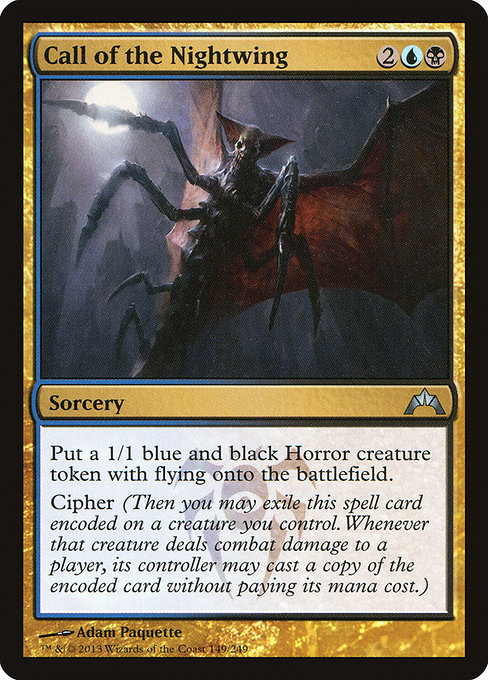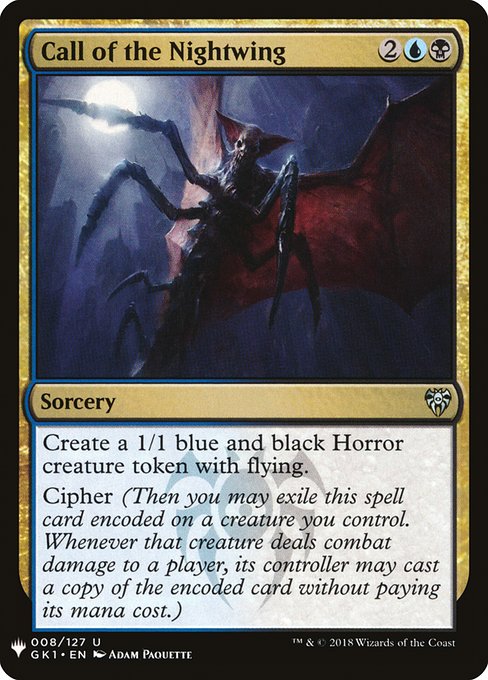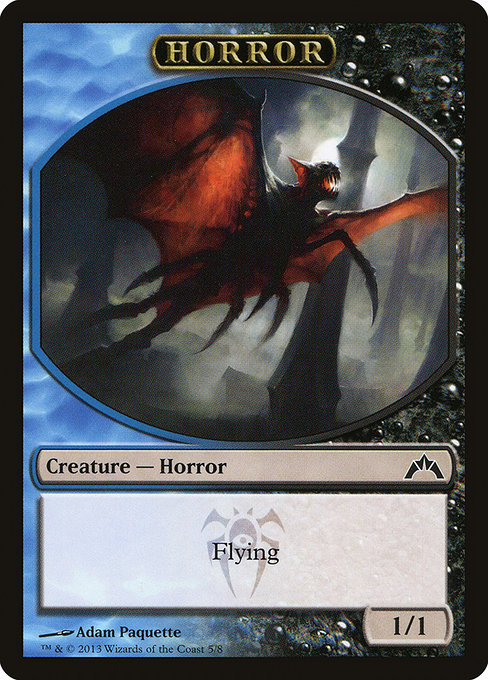Llamada del ala nocturna
Conjuro
Pon en el campo de batalla una ficha de criatura Horror azul y negra 1/1 con la habilidad de volar.Cifrar. (Luego puedes exiliar esta carta de hechizo, cifrándola en una criatura que controles. Siempre que esa criatura haga daño de combate a un jugador, su controlador puede lanzar una copia de la carta cifrada sin pagar su coste de maná.)
standard
future
historic
gladiator
pioneer
explorer
modern
legacy
pauper
vintage
penny
commander
brawl
historicbrawl
alchemy
paupercommander
duel
oldschool
premodern
Rulings
You can exile Call of the Nightwing encoded on the Horror creature token it just created.
If the spell with cipher doesn’t resolve, none of its effects will happen, including cipher. The card will go to its owner’s graveyard and won’t be encoded on a creature.
The exiled card with cipher grants a triggered ability to the creature it’s encoded on. If that creature loses that ability and subsequently deals combat damage to a player, the triggered ability won’t trigger. However, the exiled card will continue to be encoded on that creature.
The spell with cipher is encoded on the creature as part of that spell’s resolution, just after the spell’s other effects. That card goes directly from the stack to exile. It never goes to the graveyard.
If a creature with an encoded card deals combat damage to more than one player simultaneously (perhaps because some of the combat damage was redirected), the triggered ability will trigger once for each player it deals combat damage to. Each ability will create a copy of the exiled card and allow you to cast it.
If you choose not to cast the copy, or you can’t cast it (perhaps because there are no legal targets available), the copy will cease to exist the next time state-based actions are performed. You won’t get a chance to cast the copy at a later time.
You cast the copy of the card with cipher during the resolution of the triggered ability. Ignore timing restrictions based on the card’s type.
If you want to encode the card with cipher onto a noncreature permanent such as a Keyrune that can turn into a creature, that permanent has to be a creature before the spell with cipher starts resolving. You can choose only a creature to encode the card onto.
If another player gains control of the creature, that player will control the triggered ability. That player will create a copy of the encoded card and may cast it.
If the creature leaves the battlefield, the exiled card will no longer be encoded on any creature. It will stay exiled.
You choose the creature as the spell resolves. The cipher ability doesn’t target that creature, although the spell with cipher may target that creature (or a different creature) because of its other abilities.
The copy of the card with cipher is created in and cast from exile.
If the spell with cipher doesn’t resolve, none of its effects will happen, including cipher. The card will go to its owner’s graveyard and won’t be encoded on a creature.
The exiled card with cipher grants a triggered ability to the creature it’s encoded on. If that creature loses that ability and subsequently deals combat damage to a player, the triggered ability won’t trigger. However, the exiled card will continue to be encoded on that creature.
The spell with cipher is encoded on the creature as part of that spell’s resolution, just after the spell’s other effects. That card goes directly from the stack to exile. It never goes to the graveyard.
If a creature with an encoded card deals combat damage to more than one player simultaneously (perhaps because some of the combat damage was redirected), the triggered ability will trigger once for each player it deals combat damage to. Each ability will create a copy of the exiled card and allow you to cast it.
If you choose not to cast the copy, or you can’t cast it (perhaps because there are no legal targets available), the copy will cease to exist the next time state-based actions are performed. You won’t get a chance to cast the copy at a later time.
You cast the copy of the card with cipher during the resolution of the triggered ability. Ignore timing restrictions based on the card’s type.
If you want to encode the card with cipher onto a noncreature permanent such as a Keyrune that can turn into a creature, that permanent has to be a creature before the spell with cipher starts resolving. You can choose only a creature to encode the card onto.
If another player gains control of the creature, that player will control the triggered ability. That player will create a copy of the encoded card and may cast it.
If the creature leaves the battlefield, the exiled card will no longer be encoded on any creature. It will stay exiled.
You choose the creature as the spell resolves. The cipher ability doesn’t target that creature, although the spell with cipher may target that creature (or a different creature) because of its other abilities.
The copy of the card with cipher is created in and cast from exile.
Rulings
You can exile Call of the Nightwing encoded on the Horror creature token it just created.
If the spell with cipher doesn’t resolve, none of its effects will happen, including cipher. The card will go to its owner’s graveyard and won’t be encoded on a creature.
The exiled card with cipher grants a triggered ability to the creature it’s encoded on. If that creature loses that ability and subsequently deals combat damage to a player, the triggered ability won’t trigger. However, the exiled card will continue to be encoded on that creature.
The spell with cipher is encoded on the creature as part of that spell’s resolution, just after the spell’s other effects. That card goes directly from the stack to exile. It never goes to the graveyard.
If a creature with an encoded card deals combat damage to more than one player simultaneously (perhaps because some of the combat damage was redirected), the triggered ability will trigger once for each player it deals combat damage to. Each ability will create a copy of the exiled card and allow you to cast it.
If you choose not to cast the copy, or you can’t cast it (perhaps because there are no legal targets available), the copy will cease to exist the next time state-based actions are performed. You won’t get a chance to cast the copy at a later time.
You cast the copy of the card with cipher during the resolution of the triggered ability. Ignore timing restrictions based on the card’s type.
If you want to encode the card with cipher onto a noncreature permanent such as a Keyrune that can turn into a creature, that permanent has to be a creature before the spell with cipher starts resolving. You can choose only a creature to encode the card onto.
If another player gains control of the creature, that player will control the triggered ability. That player will create a copy of the encoded card and may cast it.
If the creature leaves the battlefield, the exiled card will no longer be encoded on any creature. It will stay exiled.
You choose the creature as the spell resolves. The cipher ability doesn’t target that creature, although the spell with cipher may target that creature (or a different creature) because of its other abilities.
The copy of the card with cipher is created in and cast from exile.
If the spell with cipher doesn’t resolve, none of its effects will happen, including cipher. The card will go to its owner’s graveyard and won’t be encoded on a creature.
The exiled card with cipher grants a triggered ability to the creature it’s encoded on. If that creature loses that ability and subsequently deals combat damage to a player, the triggered ability won’t trigger. However, the exiled card will continue to be encoded on that creature.
The spell with cipher is encoded on the creature as part of that spell’s resolution, just after the spell’s other effects. That card goes directly from the stack to exile. It never goes to the graveyard.
If a creature with an encoded card deals combat damage to more than one player simultaneously (perhaps because some of the combat damage was redirected), the triggered ability will trigger once for each player it deals combat damage to. Each ability will create a copy of the exiled card and allow you to cast it.
If you choose not to cast the copy, or you can’t cast it (perhaps because there are no legal targets available), the copy will cease to exist the next time state-based actions are performed. You won’t get a chance to cast the copy at a later time.
You cast the copy of the card with cipher during the resolution of the triggered ability. Ignore timing restrictions based on the card’s type.
If you want to encode the card with cipher onto a noncreature permanent such as a Keyrune that can turn into a creature, that permanent has to be a creature before the spell with cipher starts resolving. You can choose only a creature to encode the card onto.
If another player gains control of the creature, that player will control the triggered ability. That player will create a copy of the encoded card and may cast it.
If the creature leaves the battlefield, the exiled card will no longer be encoded on any creature. It will stay exiled.
You choose the creature as the spell resolves. The cipher ability doesn’t target that creature, although the spell with cipher may target that creature (or a different creature) because of its other abilities.
The copy of the card with cipher is created in and cast from exile.
Votre collection ? vos decks ?
Envie de gérer votre collection et/ou créer des decks ?
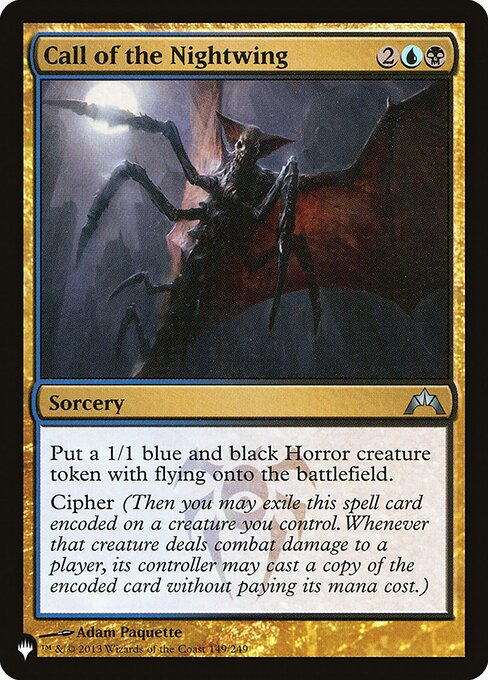

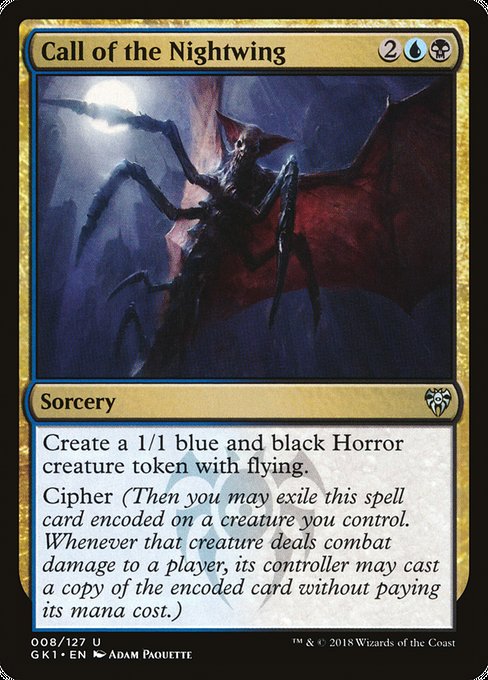
 0
0
 0.14€
0.14€
